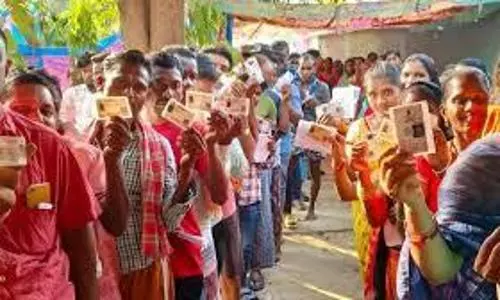
To cut terrorist attacks at their roots
text_fieldsThe people of India should have been relieved in no small measure to hear about the pre-dawn attacks by Indian Air Force (IAF) across the Pakistan border, in Balakot and Muzafarabad in Pak-occupied Kashmir which destroyed the terrorist training camps of extremist outfits Jaish-e-Mohammed, Lashkar-e-Tayyiba and Hizbul Mujahideen.
The IAF operation, in which 12 French-made Mirage aircraft participated with none of them damaged in the strike and with no human casualty, has added a shining feather to the cap of our forces. Although Pakistan forces tried to retaliate using F16 fighter jets, India's Foreign Secretary has said that they were rendered futile. The Pakistani version that the IAF bombs fell in deserted forest areas and nothing had happened to anybody, is naturally a claim meant for internal consumption.
Pakistan prime minister Imran's Khan's response that IAF's crossing of Line of Control was illegal and Pakistan had a right to retalilate, will only bear witness to the pain inflicted on them by Indian forces. Indian official sources have explained that India had no intention to attack Pakistan, and while Pakistan kept sending terrorists across the border and making attacks despite India's repeated requests, there was no alternative for India but to teach Pakistan a lesson and that was what led to the latest operation. The latest assault in Pulwama was something beyond what India could bear. The convoy of vehicles carrying jawans was hit by a car laden with heavy explosives, and driven by a suicide terrorist and the operation took the precious lives of 40 jawans. The terror outfit of Jaish-e-Mohammed led by Masood Azhar claimed responsibility for the act too. Masood Azhar, it may be recalled, was the leader of the gang that hijacked an Indian aircraft during the first NDA government, but was released by the central government in order to save the lives of innocents. And the role played by his group in destroying peaceful life in Kashmir during the two decades before and after that was often laid bare by the government. As a result, the United Nations and countries including America have banned Jaish-e-Mohammed. Pakistan itself was forced to include that organization among banned outfits. Even after all that, Pak rulers were willing to give him safe asylum.
Ever since Imran Khan became Pakistan's prime minister, he has been talking about restoring normalcy in relations with India and achieving peace. He asks for resumption of talks and resolving bilateral issues. In reciprocation, Indian prime minister Narendra Modi and the top rung of the government ask Imran to take appropriate action against the accused in Mumbai terrorist attacks, and also to transfer the terrorists sought by India. And to Modi's question whether he would keep his word, Imran's reply was that he was the son of a Pathan - implying that as a Pathan he would never break his promise. But the fact is that before the pressure of the military and dominant religious organizations, Imran is helpless. Further, it is not an unfounded inference that Imran's very accession to power was managed by Pakistan's military. Imran has no way but to rectify the present state of Pakistan as a safe haven for outfits denounced by the UN and world powers alike. Or else he and his country will have to pay a heavy price.
The statement of Imran Khan after convening a meeting of the leading figures of his government, is a clear indication of a retaliatory attack. It is a critical time for our defence forces, the government and the people to stand as one to resist and defeat the threat. Though mutual accusations and criticisms are natural in the background of a fast approaching general election, every one should be guided by the realization that the nation can survive crises only by staying safe and secure. Patriotism and national security are not to be a monopoly of some. Across religious-caste-political barriers, the entire citizenry of India is united in the matter of national security. There should not be a state of affairs where the loyalty and commitment to the nation of some sections are doubted or questioned, on the basis that the other side is Pakistan. When Kashmiris were attacked in other parts of the country in the wake of Pulwama explosion, the warning given by the Supreme Court and the prime minister should not fail to be seriously heeded.























